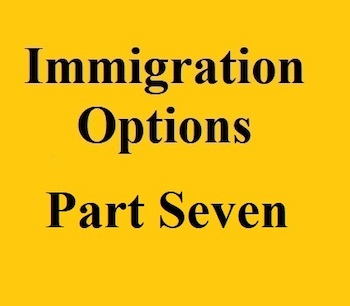Peirspictiochtai Ar An Saol
Options To Update Immigration Policies Into The United States Of America
Part Seven

During the past few weeks, Peirspictiochtai Ar An Saol detailed a variety of ways that the United States of America could update the country's policies regarding immigration into this nation.
Examples were provided showing how American land could be leased permanently to another nation; how pregnant women nearing their times of giving birth as well as others needing immediate medical care could be provided with that needed assistance in a humane manner; how babies born to those pregnant women would not attain American citizenship because the babies were never under the jurisdiction of the United States; how people could be transported in vehicles to, from, and within the United States of America without impacting their immigration status or their citizenship because they were not subject to American laws; how people legitimately seeking asylum could be housed in safe areas while their individual cases were reviewed based on a timetable set by the United States; how the country could effectively stop individuals not approved for entry into the United States from ever being under the jurisdiction of the United States; and how the United States could reassert its authority to determine entry by non-citizens into the country.
While existing systems and current policies could be adapted to achieve those goals, it is unlikely that these options will become reality in the near term.
The reasons?
The United States would have to decide that controlling its borders was in the national interest of the country. All of the country.
The United States would have to decide that it could offer humane, compassionate services to people in imminent need of medical care, yet not be forced to allow individuals to enter the country without permission or to be forced to accord citizenship based on the actions of individuals who enter the country without permission.
The United States would have to decide that the national government could establish its own timetable to make decisions regarding asylum requests and the establishment of citizenship.
The United States would have to decide that the national government was willing to permanently lease land to another country or other countries to temporarily house people attempting to enter the United States without permission and/or individual states would have to decide they were willing to permanently lease land to another country or other countries to temporarily house people attempting to enter the United States without permission.
Another country or countries would have to decide that they were willing to permanently lease land in the United States and be responsible for the housing of people attempting to enter the United States without permission.
The United States would have to decide to recognize the diplomatic status accorded to individuals being housed by another country or countries on land permanently leased to that country or those countries within the boundaries of the United States.
The options exist for the United States of America to offer asylum to people needing that protection without the United States being forced to accept immigrants into the country before making decisions regarding asylum requests.
The options exist for the United States of America to welcome immigrants to the United States – immigrants that follow the rules set by this country for entry into this country.
In sum, the United States of America would have to be accountable to the people of the United States of America and the United States of America would have to be responsible for the life, liberty, and pursuit of happiness for the citizens and legal residents of the United States of America.
Whether the United States of America chooses to be accountable and responsible is a decision for the American people.
Peirspictiochtai Ar An Saol – Gaelic – Irish – for "Perspectives On Life" is a column focused on aspects of accountability and responsibility as well as ways people look at life.
Contact Richard McDonough at
© 2024 Richard McDonough










